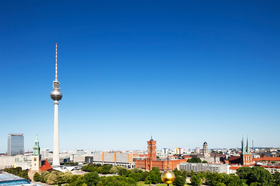The WPJ
THE WORLD PROPERTY JOURNALReal Estate Facts Not Fiction
Residential Real Estate News

Eurozone Debt Crisis Boosting Germany's Residential Markets, Flight to Safety Drives €6.1 Billion of Investment in 2011
Residential News » Europe Residential News Edition | By Michael Gerrity | February 6, 2012 9:52 AM ET
 Based on new research from CBRE Germany, transaction volumes across German residential property portfolios of more than 50 units increased by 44 per cent year-on-year to â¬6.12 billion (USD $8 billion) in 2011. The number of traded residential units also increased by 27 per cent to around 92,000 units within 194 transactions, indicating that the market for large portfolios of over 1,000 units has regained momentum.
Based on new research from CBRE Germany, transaction volumes across German residential property portfolios of more than 50 units increased by 44 per cent year-on-year to â¬6.12 billion (USD $8 billion) in 2011. The number of traded residential units also increased by 27 per cent to around 92,000 units within 194 transactions, indicating that the market for large portfolios of over 1,000 units has regained momentum.The demand for residential units in Berlin was particularly strong. The federal capital traded around â¬2.3 billion and more than 32,300 residential units last year, which accounts for 37 per cent of the registered investment volumes and 37 per cent of all residential units in Germany. As a result of the large transaction volumes and high-end development projects in Berlin, the average price per sq m increased to â¬1,033.
CBRE attributes the run on German housing stock to the impact of the European sovereign debt crisis, which is driving German and international institutional investors towards tangible assets and the country's stable residential market.
CBRE's Head of Residential Investment in Germany Konstantin Lüttger tells World Property Channel, "German residential is regarded as a secure investment at a time when the European sovereign debt market is in crisis and international capital markets are volatile. This has resulted in a strong year for the country's housing industry. Developers have benefitted from a strong demand for individual sales as well as capital investments, not least because rents are increasing in both large and prosperous medium-sized cities and university towns where there is a shortage of supply. The confidence of both national and international investors in the German residential market is clearly reflected in last year's impressive trading levels."
Listed property companies dominated the investment market with an overall volume of 32 per cent. In conjunction with closed-end investment vehicles, private investors were also very active and accounted for more than 13 per cent. Investments were also made by open-ended (special) real estate funds (13%) as well as the public sector (10%).
Domestic investors accounted for â¬4.35 billion (more than 71 per cent) of the overall investment figure. They were followed by investors from the USA (5.7 per cent), Sweden (4.2 per cent) and Austria (3.4 per cent).
Sign Up Free | The WPJ Weekly Newsletter
Relevant real estate news.
Actionable market intelligence.
Right to your inbox every week.
Real Estate Listings Showcase
Related News Stories
Residential Real Estate Headlines
- More Americans Opting for Renting Over Homeownership in 2024
- BLOCKTITLE Global Property Tokenization Platform Announced
- Small Investors Quietly Reshaping the U.S. Housing Market in Late 2024
- Greater Miami Overall Residential Sales Dip 9 Percent in November
- U.S. Home Sales Enjoy Largest Annual Increase in 3 Years Post Presidential Election
- U.S. Housing Industry Reacts to the Federal Reserve's Late 2024 Rate Cut
- U.S. Home Builders Express Optimism for 2025
- Older Americans More Likely to Buy Disaster-Prone Homes
- NAR's 10 Top U.S. Housing Markets for 2025 Revealed
- U.S. Mortgage Delinquencies Continue to Rise in September
- U.S. Mortgage Rates Tick Down in Early December
- Post Trump Election, U.S. Homebuyer Sentiment Hits 3-Year High in November
- Global Listings Aims to Become the Future 'Amazon of Real Estate' Shopping Platform
- Greater Las Vegas Home Sales Jump 15 Percent in November
- Ultra Luxury Home Sales Globally Experience Slowdown in Q3
- World Property Exchange Announces Development Plan
- Hong Kong Housing Market to Reach Equilibrium in Late 2025
- Construction Job Openings in U.S. Down 40 Percent Annually in October
- U.S. Mortgage Applications Increase in Late October
- World Property Markets, World Property Media to Commence Industry Joint-Venture Funding Rounds in 2025
- New Home Sales Hit 2 Year Low in America
- U.S. Pending Home Sales Increase for Third Consecutive Month in October
- Pandemic-led Residential Rent Boom is Now Fizzling in the U.S.
- Emerging Global Real Estate Streamer WPC TV Expands Video Programming Lineup
- 1 in 5 Renters in America Entire Paycheck Used to Pay Monthly Rent in 2024
- U.S. Home Sales Jump 3.4 Percent in October
- Home Buyers Negotiation Power Grows Amid Cooling U.S. Market
- Canadian Home Sales Surge in October, Reaching a Two-Year High
- Greater Orlando Area Home Sales Continue to Slide in October
- U.S. Mortgage Credit Availability Increased in October
- U.S. Mortgage Rates Remain Stubbornly High Post Election, Rate Cuts
- Construction Input Prices Continue to Rise in October
- BETTER MLS: A New Agent and Broker Owned National Listings Platform Announced
- Home Prices Rise in 87 Percent of U.S. Metros in Q3
- Caribbean Islands Enjoying a New Era of Luxury Property Developments
- The World's First 'Global Listings Service' Announced
- Agent Commission Rates Continue to Slip Post NAR Settlement
- Market Share of First Time Home Buyers Hit Historic Low in U.S.
- Greater Palm Beach Area Residential Sales Drop 20 Percent Annually in September
- Mortgage Applications in U.S. Dip in Late October
Reader Poll
Marketplace Links
This website uses cookies to improve user experience. By using our website you consent in accordance with our Cookie Policy. Read More





